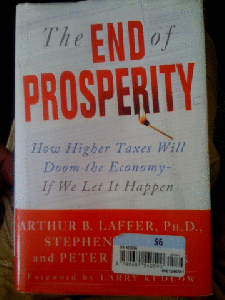Detailing the brutal assault on the US economy by politicians, both Republican and Democrat, this book also serves to offer advice on repairing the damage. “The End of Prosperity” is my book of the month and was written by by Arthur Laffer, Steve Moore, and Peter Tanous. This post has the summary of chapters 10, 11 and 12. The rest of the chapters will follow soon.
After the summary is complete (in a few days), I will follow-up with my review and a critique.
My next book summary, review and critique will probably be a left-wing book as this is a right-wing book and I want to keep it fair. I’m planning on doing The Audacity of Hope of Barack Obama as that seems a good balance to this one.
• Book Summary •
 |
The End of Prosperity
How Higher Taxes Will Doom the Economy- If We Let It Happen
|
Chapter 10: How to Create a Bull Market
In the 1970’s high inflation pared with high capital gains taxes raised the effective capital gains tax to almost 100%. The higher the tax, the less incentive to risk capital with investment. In 1981 America passed a bi-partisan tax reduction bill that cut the capital gains tax from 35 to 28%. This was the first official act of the supply-side revolution. It is now 15%. Obama wants to put it back to 28%.
Jesse Jackson once said, “without capital, capitalism is just another ism”. Why do American workers earn 5-10 times more per hour than Mexican workers? Because our advantage in capital investment makes our workers more productive. More productive workers earn more money.
History shows that when the capital gains tax is cut, revenues go up. When the expected profit from investments increase, so does the amount of investments, shrinking the tax base. President Bush cut the tax rate to 15% in 2003, and was vindicated when revenues jumped from 47 billion in 2003, to 97 billion in 2006, and 110 billion in 2007. Raising the capital gains tax won’t earn America any more revenue, it will cost us revenue.
The capital gains tax is not indexed to inflation. So many times the so-called “gains” are just inflationary prices at work. Government is taxing investors for inflation. Ending the capital gains tax will allow even more capital migration into this country, boost the stock market and increase the earnings of American Workers.
Chapter 11: Throw Momma from the Train
In 2009 the 55% estate tax will drop to 45%, before going away completely in 2009. Then, due to archaic budget rules, it goes back up to 55% in 2011. The argument against it is straightforward: It raises very little revenue, has a 65 cents on the dollar compliance costs, and pushes money out of efficient economy-growing investments into inefficient tax shelters, and it fails to keep wealth from handing over to the next generation.
It just doesn’t work. Families with a great deal of wealth are able, through the myriad of loopholes to protect their family fortunes while less well off, but still wealthy families are left breaking up their family businesses to pay the tax.
Last year the Swedes and the Russians both got rid of their estate taxes. The Swedes are among the most socialist people on the planet, and the Russians are among the most authoritarian. Yet both made the same decision, that the estate tax was counter-productive to economic growth.
Chapter 12: Protectionism Then and Now
Not only do many economists believe the Smoot-Hawley tariff act of 1930 caused the Great Depression, but the fear of its enactment most likely also caused the stock market crash of 1929. In the roaring 20’s the economy was going strong, except for the farmers. The Smoot-Hawley tariff act began as an attempt to protect farmers from foreign competition. Soon, other industries were added to the bill. Though it failed to pass in 1929, other countries reacted to our tariffs were punitive tariffs of their own. On the morning of the Stock Market crash of 1929, the government assured the people they’d get it passed in the very next legislative session.
The result wasn’t an increase in farmers wages, by 1932 the States GDP fell to 68 billion from a high of 104 billion. Exports had collapsed from 5.2 to 1.6 billion. By 1933 unemployment was at 25%.
Today, we have people calling for protectionism once more. Tales of Ohio’s lost manufacturing make a great human-piece article. But the truth can be found in Texas, where manufacturing is booming and supply-side economics are followed. They have added 36,000 manufacturing jobs since 2004. Ohio complains about losing factories, even as it charges the third-highest corporate tax rate in the country of 10.5%.
South Carolina has lost thousands of low-wage textile jobs to outsourcing. But they’ve gained thousands more jobs in higher-paying high tech production jobs. BMW has invest 3.5 billion South Carolina, and plans to invest 750 billion more to expand it’s production.
The Trade Deficit and outsourcing has been unfairly turned into a boogeyman. There is also insourcing. US subsidiaries of foreign companies employ 5.4 million Americans and 31% of them are in manufacturing. History shows that as the trade balance lowers unemployment goes up. If Lou Dobbs really wants to fix the trade deficit, he should cheer on American’s growing unemployment.
We fear that Congress may again pass wrong-minded protectionist laws. Great nations thrive on free trade, it doesn’t cost us jobs; it adds jobs, increases workers spending power, and creates and Capital Surplus where Capital flows into America from other countries.
 Book Summary and Review: “FairTax: The Truth”
Book Summary and Review: “FairTax: The Truth” Top Story: Citizens United
Top Story: Citizens United America At War
America At War Opinion/Argument
Opinion/Argument Book Notes
Book Notes


Recent Comments